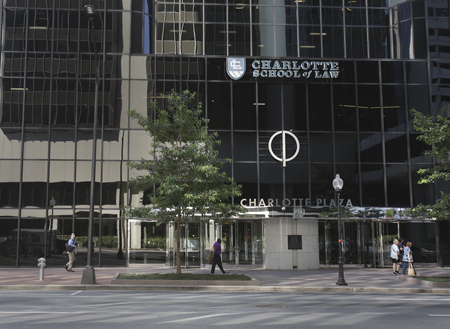Student lawsuits against Charlotte School of Law consolidated

The Charlotte School of Law. ABA Journal file photo by Albert Dickson.
A defense motion to consolidate three putative class actions filed against Charlotte School of Law—all of which allege that the for-profit law school misrepresented its ABA-accreditation status and bar passage rates—was granted Friday by a North Carolina U.S. District Court judge.
The lawsuits were filed by former Charlotte School of Law students, Bloomberg News reports. There are also at least 20 state cases filed against the law school with similar allegations, according to U.S. District Court Judge Graham C. Mullen’s order (PDF). The federal lawsuits allege unjust enrichment, breach of fiduciary duty, constructive fraud, and they are seeking an unspecified amount in damages.
Mullen noted in his Oct. 13 order that if the three cases were kept separate, the defense would need to do identical discovery in each, and the court would be burdened with overseeing and managing three different discovery periods, on three separate schedules.
“Any alleged differences are negligible and are greatly outweighed by the efficiencies gained by consolidation,” the order states.
Charlotte School of Law closed in August after the council of the ABA’s Section of Legal Education and Admissions to the Bar rejected its teach-out plan. That followed the U.S. Department of Education pulling the school’s access to student loans, the state accreditation agency denying its request for a license deadline extension and the North Carolina attorney general’s office opening a civil fraud investigation.
Out of the three federal court actions, only the plaintiffs in one, Barchiesi v. Charlotte School of Law (PDF), objected to the defense’s consolidation motion. Those plaintiffs had no objections to coordinating discovery depositions of Charlotte School of law “agents and employees,” but opposed being tied to a discovery schedule and case management orders that are “far broader in all respects,” and would likely involve more discovery than their case, according to a Sept. 25 response motion (PDF).
Also, on Oct. 12 Charlotte School of Law filed an amended answer (PDF). It alleges that a July 2016 ABA Section of Legal Education and Accreditation decision directing the law school to publish specific actions on the law school’s website was stayed, and the ABA committee directed Charlotte School of Law to provide additional information and appoint a fact-finder to review “multiple issues, including CSL’s admissions policies, overall rigor of the program of legal education, certain bar examination results, rate of default on student loans taken by CSL’s graduates and employment status of the CSL graduates.”
The filing also argues that the plaintiffs consented to and ratified CSL’s actions, “by, among other things, remaining enrolled and/or reenrolling, despite being on actual or constructive knowledge of the ABA accreditation review, CSL’s bar passage rates, CSL’s employment statistics, the rigor of CSL’s curriculum and CSL’s admission statistics and policies.”
The other two lawsuits are Krebs v. Charlotte School of Law (PDF) and Levy v. Charlotte School of Law (PDF). Charlotte School of Law is part of the InfiLaw System, which has Sterling Partners as its parent company. In July, Mullen dismissed Sterling Partners as a defendant in the Krebs lawsuit on the basis that the court had no jurisdiction over the Sterling Capital entities.
Write a letter to the editor, share a story tip or update, or report an error.


